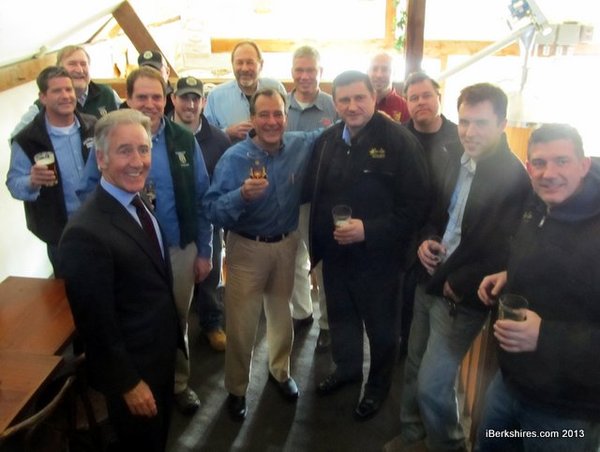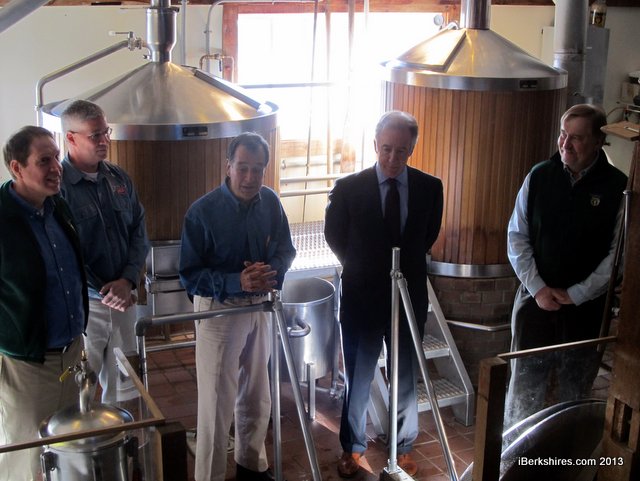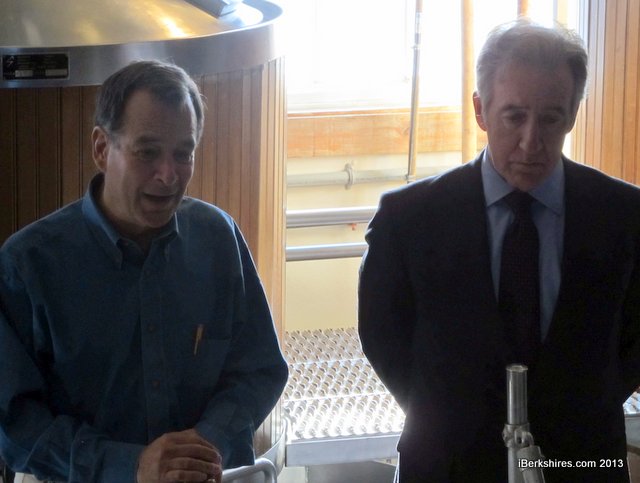
State's Brewers Rally Behind Neal's Brewery Tax Reform
|
Andrew Mankin of Barrington Brewery, Rob Martin of Ipswitch Brewery, Jim Koch of Samuel Adams, U.S. Rep. Richard Neal and Gary Happ of Barrington Brewery plead their case for lower taxes. |
GREAT BARRINGTON, Mass. — About a dozen of the state's small brewers joined U.S. Rep. Richard Neal on Thursday at Barrington Brewery to support legislation that would lower taxes on small breweries.
Neal is again putting forth the Small Brewer Reinvestment and Expanding Workforce Act, which would create a graduated excise tax on barrels of beer.
Currently, the first 60,000 barrels produced in a year are taxes at $7 per barrel and $18 for all barrels after that. The bill would have an escalating rate from $3.50 to $16 for breweries producing less than 6 million barrels per year.
"These small craft brewers are generally locally owned. They generate enormous economic activity," Neal said. "The issue is a question of how you tax the first 60,000 barrels of beer. Currently it is $7 and what I am suggesting is that we ought to provide them the same opportunities to grow that the big guys have because of market share. The big guys, by the way are all owned internationally, I think they have cornered the market. What we're saying to small craft brewers is that we'd like to get you into a competitive position."
The current policy was established in 1976 and Neal has tried for three years to pass legislation to change the rate. Each year, he said he has gotten more and more support and with a chance of having a federal tax reform passing this year, there may be a chance to partner the act with that legislation.
"We've done better in each succeeding Congress," Neal said. "I am hopeful we will get some traction in Congress this time."
Neal says a study estimated that the bill would generate about $153 million in economic activity in the first year.
Jim Koch, founder of Boston Beer Co., said the bill would allow his company to grow at a much faster pace. Samuel Adams is the state's largest brewer but accounts for only about 1 percent of the nation's beer.
"It would enable us to grow faster, create more jobs and put our company on a sounder footing," Koch said. "We are trying to basically create a beer culture in America that recognizes the quality and craftsmanship of American brewing. For us, we're a little company. I've been working my butt off for 29 years and we've finally gotten 1 percent of the U.S. beer industry."
|
Koch and Neal believe that the tax reform would allow small breweries grow. |
Koch says the United States is now internationally recognized as creating the best craft beers but the regulations and tax structure are keeping the industry from reaching its full potential.
"I'm drinking Barrington Brewery's Brown Ale and it's delicious. You can take this to any pub in England and it would stand up to the best brown ales in the mother country," Koch said, adding that, "the regulations and the laws that govern the brewing were put into place during Prohibition and the 1970s. They have not been updated to accompany the change in the industry."
Ned LaFortune, co-founder of Wachusett Brewing in Westminster, said the extra money generated from a lower tax would not just pile into the owner's bank account but all of it would go right back into the business.
"We're very much underfunded right now. I've been in this for 19 years and almost every penny we make goes back into people and equipment," LaFortune said. "Everyone in the company knows about this bill and everyone knows that it will all go right back into it. We're going to be hiring more people."
LaFortune says the bill would create an additional $95,000 to pay for more employees and benefits.
"We work on very low margins but we work on very high passion," said Rob Martin, president of both the Massachusetts Brewers Guild and the Ipswitch Ale Brewery. "Our industry treats our employees well."
Neal said that everywhere in the country there are craft brewers but in total they only represent 6 percent of the market. Beyond that, craft breweries are "destinations" and often include restaurants and other business concepts.
"Many of the individuals here today are also in the ancillary restaurant business and they largely do pub food, which has great appeal to a large segment of the market, and everybody here or employed is a local," Neal said.
LaFortune said his company was built "literally from scratch" and now employs some 25 Massachusetts residents with "great benefits and competitive wages."
"Our business plan in 1993 was to sell beer in Massachusetts in the Worcester area. We are 19 years in now and 90 percent of our beer is sold in Massachusetts. And everyone of my employees is local," LaFortune said.
Neal said hundreds of residents in his district are employed by small brewers and about 1,300 are employed statewide but he will have to convince other congressmen that it is important to them too.
"Small brewers in America have no better friend and champion than Richard Neal," Koch said.
Tags: brewery, brewing, Congress, excise taxes, Neal,

















